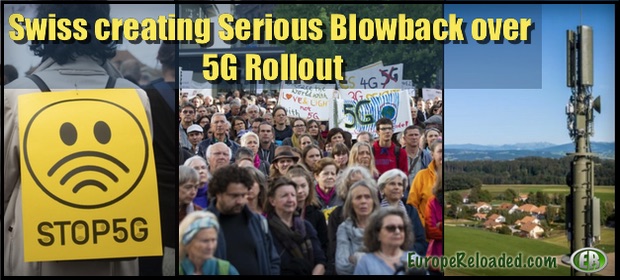
Smackdown: Swiss Revolt Against 5G Over Health Fears
 Peter Mosimann: Bundeshaus, Wikimedia Commons
Peter Mosimann: Bundeshaus, Wikimedia CommonsTECHNOCRACY NEWS
Ponder the phrase, ‘nationwide revolt’. Switzerland is the latest nation to give 5G providers a major setback, following other European nations. Most importantly, Technocracy is taking a huge hit. ⁃ TN Editor
Switzerland was among the first countries to begin deploying 5G, but health fears over radiation from the antennas that carry the next-generation mobile technology have sparked a nationwide revolt.
Demonstrators against the technology are due to fill the streets of Bern later this month, but already a number of cantons have been pressured to put planned constructions of 5G-compatible antennae on ice.
The technology has been swept up in the deepening trade war between China and the United States, which has tried to rein in Chinese giant Huawei — the world’s leader in superfast 5G equipment — over fears it will allow Beijing to spy on communications from countries that use its products and services.
But far from the clash of the titans, a growing number of Swiss are voicing alarm at possible health effects from exposure to the electromagnetic rays radiating from the new antennae, and are threatening to put the issue to a referendum in the country famous for its direct democratic system.
It wasn’t supposed to be this way.
In February, Switzerland took a big step towards deployment when it attributed 5G frequencies to three major operators, Swisscom, Sunrise and Salt, allowing the country to rake in revenues of nearly 380 million Swiss francs ($384 million, 350 million euros).
High on their success, the operators raced to trumpet on television advertisements and billboards that the cutting-edge technology would be available this year in cities, in the countryside and even in mountainous regions.
By early July, 334 antennae stations for 5G were operational across the country, authorities told AFP.
But the rollout has run into some serious hurdles.
Several cantons including Geneva have buckled to pressure from online petitioners demanding a halt to construction of the 5G infrastructure.
But while no new antennae are being built in parts of the country, the operators are still converting existing 4G antennae for 5G use — something they can do without authorisation.
National carrier Swisscom thus says it expects 90 percent of the population to have 5G access by the end of the year.
Opponents meanwhile warn that 5G poses unprecedented health and environmental risks compared to previous generations of mobile technology, and are urging authorities to place a full-fledged moratorium on the rollout.
They will organise a large protest on September 21 in front of the government buildings in Bern, and are also working towards putting the issue to a popular vote.
“I think we have most citizens on our side,” Coco Tache-Berther, of the organisation Fequencia, told AFP, saying Switzerland’s rapid roll-out of 5G was “ultra-shocking”.
Olivier Pahud, who regularly demonstrates against 5G in front of the UN in Geneva, agreed, insisting the technology will have “impacts on health, on the environment, on people’s capacity to think.”
And for people like him, who suffer from “electromagnetic hypersensitivity”, the new technology will be devastating, he said.
The condition is not recognised as a medical disorder in most countries, but sufferers insist that exposure to mobile phones, wifi routers, televisions and other gadgets cause them anything from mild discomfort to life-ruining disability.
The powerful Swiss Federation of Doctors is also urging caution, maintaining that “as long as there is no scientific proof that raising the radiation limits will not impact health, one must refrain from raising them.”
Noxious effect?
In Geneva, it is Daniel Buchs, a doctor and a regional parliamentarian with the centrist Christian Democratic Party, who is leading the battle.
“We are waiting for a serious, independent study that shows whether, yes or no, 5G has a noxious effect for the population,” he told AFP.
Such a study, he insisted, could help avoid a health scandal similar to the one the world has seen with asbestos, which was long touted as safe but which today is known to kill at least 107,000 people around the world each year.
There are already several studies underway, including one by the World Health Organization, which told AFP it had begun “conducting a risk assessment of health outcomes from radiofrequency fields exposure.”
**********
Original article

••••
The Liberty Beacon Project is now expanding at a near exponential rate, and for this we are grateful and excited! But we must also be practical. For 7 years we have not asked for any donations, and have built this project with our own funds as we grew. We are now experiencing ever increasing growing pains due to the large number of websites and projects we represent. So we have just installed donation buttons on our websites and ask that you consider this when you visit them. Nothing is too small. We thank you for all your support and your considerations … (TLB)
••••
Comment Policy: As a privately owned web site, we reserve the right to remove comments that contain spam, advertising, vulgarity, threats of violence, racism, or personal/abusive attacks on other users. This also applies to trolling, the use of more than one alias, or just intentional mischief. Enforcement of this policy is at the discretion of this websites administrators. Repeat offenders may be blocked or permanently banned without prior warning.
••••
Disclaimer: TLB websites contain copyrighted material the use of which has not always been specifically authorized by the copyright owner. We are making such material available to our readers under the provisions of “fair use” in an effort to advance a better understanding of political, health, economic and social issues. The material on this site is distributed without profit to those who have expressed a prior interest in receiving it for research and educational purposes. If you wish to use copyrighted material for purposes other than “fair use” you must request permission from the copyright owner.
••••
Disclaimer: The information and opinions shared are for informational purposes only including, but not limited to, text, graphics, images and other material are not intended as medical advice or instruction. Nothing mentioned is intended to be a substitute for professional medical advice, diagnosis or treatment.




